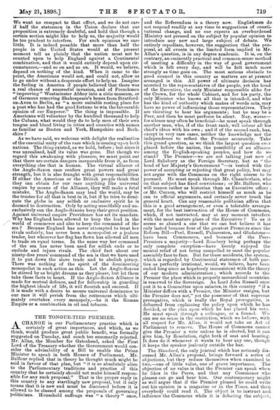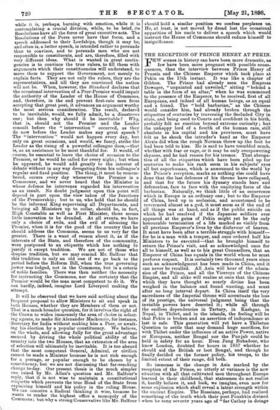THE TONGUE-TIED PREMIER.
ACHANGE in our Parliamentary practice which is certainly of great importance, and which, as we think, would produce great public benefit, was formally suggested on Tuesday, and much too summarily rejected. Mr. Allan, the Member for Gateshead, asked the First Lord of the Treasury whether the Government would con- sider the advisability of a Bill to enable the Prime Minister to speak in both Houses of Parliament. Mr. Balfour replied that in theory he thought much might be said in favour of that plan, but " it is so absolutely alien to the Parliamentary traditions and practice of this country that he certainly should not make himself respon- sible for any such proposal." That is the proper reply in this country to any startlingly new proposal, but it only means that it is new and must be discussed before it is allowed to be classed among the proposals of governing politicians. Household suffrage was " a theory " once, and the Referendum is a theory now. Englishmen do not respond readily at any time to suggestions of consti- tutional change, and no one expects an overburdened Ministry not pressed on the subject by popular opinion to introduce any new and large subject of debate. We entirely repudiate, however, the suggestion that the pro- posal, at all events in the limited form implied in Mr. Allan's question, is in any degree academic. It is, on the contrary, an eminently practical and common-sense method of meeting a difficulty in the way of good government which is felt every day, and will be felt much more strongly as time goes on. The most serious obstacle to good counsel in this country as matters are at present arranged is this. All power of ultimate decision has accreted to the representatives of the people, yet the head of the Executive, the only Minister responsible alike for the Crown, for the whole Cabinet, and for his party, the only Minister who knows all that is intended, and who has the kind of authority which makes of words acts, may have no power of influencing those representatives. They are thirsting to hear his arguments ; but he may be a Peer, and then he must perforce be silent. Nay, worse— for silence may often be beneficial—he must speak through another man, who, if of the front rank, will colour all his chief's ideas with his own ; and if of the second rank, has, except in very rare cases, neither the knowledge nor the independence to reflect the Premier accurately. Take this grand question, as we think the largest question ever placed before the nation, the possibility of an alliance among the English-speaking peoples, and how do we stand? The Premier—we are not talking just now of Lord Salisbury as the Foreign Secretary, but as " the head of her Majesty's Government "—is vested with the power of accepting or rejecting that great policy, but may not argue with the Commons on the right course to be pursued. He must speak through Mr. Chamberlain, who on that subject has fixed convictions ; or Mr. Balfour, who will reason rather as historian than as Executive officer ; or Mr. Curzon, who will restrict himself as much as he can to official arguments, and certainly never touch the general heart. Can any reasonable politician affirm that this is a good arrangement, or even a tolerable arrange- ment, for the best instruction of the House of Commons, which, if not instructed, may at any moment interfere with the most mature plans of the Executive ? To us it seems so absurd a one that we can but believe it has only lasted because four of the greatest Premiers since the Reform Bill—Peel, Russell, Palmerston, and Gladstone— have been Commoners, and because of the Peer- Premiers a majority—Lord Rosebery being perhaps the only complete exception—have keenly enjoyed the mental relief of not being compelled to meet the popular assembly face to face. But for these accidents, the system, which is regarded by Continental statesmen of both par- ties as perfectly irrational, would, we believe, have been ended long since as hopelessly inconsistent with the theory of our modern administration ; which accords to the Premier the place which in properly monarchical countries is reserved to the Sovereign. As Lord John Russell once put it to a Committee upon salaries, in this country " if a. Minister differs with a Premier, the Minister resigns, but the Premier does not," yet the possessor of that supreme prerogative, which is really the Royal prerogative, is debarred from explaining the policy upon which he has decided, or the plan upon which he has placed his veto. He must speak through a colleague, or a funnel. We can see no sense in the restriction, which we believe, with all respect for Mr. Allan, it would not take an Act of Parliament to remove. The House of Commons cannot give the Premier a vote unless he is elected, but it can give him, by Resolution, right both of seat and hearing. It does do it whenever it wants to hear any one, though it keeps the speaker jealously outside the bar.
The Standard, the only journal which has seriously dis- cussed Mr. Allan's proposal, brings forward a, series of objections, but they reduce themselves when examined to two,—one of little value, one of grave importance. The objection of no value is that the Premier can speak when he likes in the Peers, and that any Commoner who pleases can go and hear him. Our contemporary might as well argue that if the Premier pleased he could write out his opinion in a magazine or in the Times, and then everybody could read it. The object is to instruct and influence the Commons while it is debating the subject, while it is, perhaps, burning with emotion, while it is contemplating a crucial division, while, to be brief, its Resolutions have all the force of great executive acts. The Resolutions of the Peers never have that force, and a speech addressed to their Lordships, though it may be, and often is, a better speech, is intended rather to persuade than to convince, and to persuade men who are not responsible to constituents, and are, therefore, filled with very different ideas. What is wanted in great contin- gencies is to convince the true rulers, to fill them with arguments which their constituencies will understand, to move them to support the Government, not merely to explain facts. They are not only the rulers, they are the representatives, and till they are convinced the nation will not be. When, however, the Standard declares that the occasional intervention of a Peer-Premier would impair the authority of the Leader of the House of Commons, and, therefore, in the end prevent first-rate men from accepting that great post, it advances an argument worthy the most serious consideration. The result, declared to be inevitable, would, we fully admit, be a disastrous one ; but then why should it be inevitable ? Why, that is, should not the Premier and the Leader consult before the " intervention " occurred, as they do now before the Leader makes any great speech ? The " intervention " would not happen every day, but only on great occasions, and would, we fancy, strike the Leader as the rising of a powerful colleague does,—that is, as an assistance to be most thankful for. It would, of course, be essential to leave the choice of occasion to the Premier, or he would be called for every night ; but when he appeared, he would add greatly to the interest of debate without in any way derogating from his colleague's regular and fixed position. The thing, it must be remem- bered, occurs every day whenever the Premier is a 'Commoner, and we never heard that the Minister in whose defence he intervenes regarded his intervention as an insult. No doubt judgment upon this point will depend in part upon the view taken of the functions of the Premiership ; but to us, who hold that he should be the informal King supervising all Departments, and bringing all Ministers up to collar, should be, in fact, High Constable as well as First Minister, there seems little innovation to be dreaded. At all events, we have only a choice of evils, and the evil of silencing the 'Premier, when it is for the good of the country that he should address the Commons, seems to us very far the greater. There is a want of reason about it, as if the interests of the State, and therefore of the community, were postponed to an etiquette which has nothing to justify it except tradition. We are not of those who despise tradition, but we may remind Mr. Balfour that this tradition is only an old one if we go back to the period before the Reform Bill, when the true governing power was lodged, not in the Commons, but in a coterie of noble families. There was then neither the necessity for instructing the Commons, nor the certainty that the Premier would be the man most competent to do it. We can hardly, indeed, imagine Lord Liverpool making the attempt.
It will be observed that we have said nothing about the frequent proposal to allow Ministers to sit and speak in both Houses, whether they are Members of them or not. That is a much broader question, for it involves the right of the Crown to widen immensely the area of choice in select- ing agents, to make Sir Alexander Mackenzie, for instance, Secretary for India without making him a Peer, or await- ing his election by a popular constituency. We believe, on the whole, and allowing fully for the great advantage secured by driving the whole political ability of the country into the two Houses, that an extension of the area of selection will ultimately be inevitable. It is too absurd that the most competent General, Admiral, or civilian cannot be made a Minister because he is not rich enough for a peerage, or popular enough to be chosen by a constituency, but we are not discussing that far-reaching change to-day. Our present thesis is the much simpler one raised by Mr. Allan's question and Mr. Balfour's reply, that it is not wise to maintain a constitutional etiquette which prevents the true Head of the State from explaining himself and his policy in the ruling House. We can conceive a Radical thinking it wise, because he wants to render the highest office a monopoly of the Commons; but why a strong Conservative like Mr. Balfour should hold a similar position we confess perplexes us. He, at least, is not moved by dread lest the occasional apparition of his uncle to deliver a speech which would instruct the House of Commons should reduce himself to insignificance.



































 Previous page
Previous page